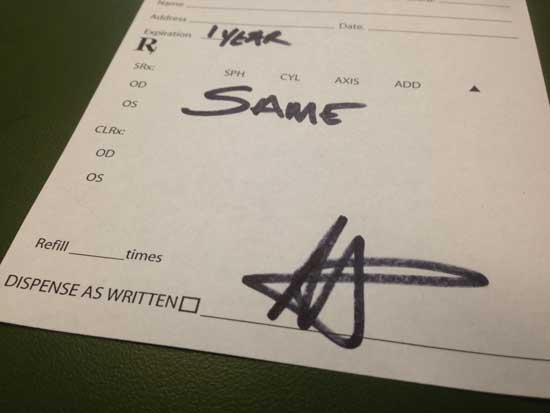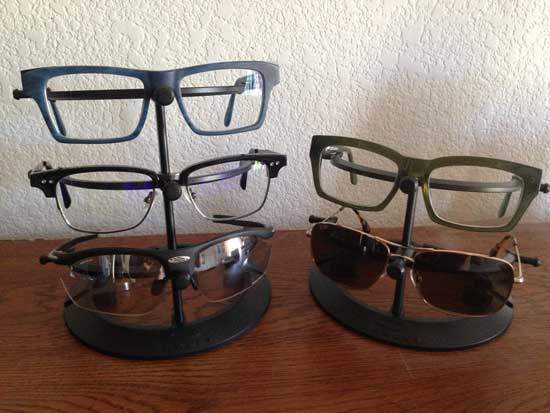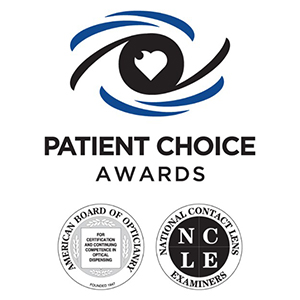A few years ago when I was new in my current optical location, I had an experience with my doctor/owner that has stayed with me for years. The result of that experience has generated business where there was virtually none. It has also shaped how our doctors discuss glasses with their patients.
The experience interaction went something like this:
Doctor: "Ms. Mary Jane has no change in her prescription and does not need new glasses – she is good to go."
Optician (Me): (I was shocked at what I was hearing! So I stepped up and said) "Are you sure there isn't something being overlooked? How are your prescription sunglasses?"
Ms. Jane: "Well I don't have any. Can you put a prescription in sunglasses?"
Optician (Me): "Yes! And your insurance benefit makes them quite affordable."
Ms. Jane left after purchasing new prescription sunglasses, despite having no change in her vision. The doctor was flat out shocked. Personally, I feel that an oft-missed opportunity is that of the patient with an unchanged prescription.

The Opportunities
So the patient hears their prescription hasn't changed. Naturally they think they don't need new glasses. This is when opticians can educate the patient that one pair of glasses doesn't always meet the need of every wearer. We can discuss patient solutions such as office lenses. These can alleviate muscle strain and soreness associated with CVS (Computer Vision Syndrome) as a result of using traditional progressive lenses in the office. Did the doctor ask the patient about this? Or are you going to be the Hero and present this option to the patient?
Every summer I see all of the major eyewear publications talking about prescription sunglasses. If a patients' prescription hasn't changed, I always start by discussing prescription sunwear. It is an important accessory for the health of our eyes and our skin. I consider my sunwear an important piece of equipment just like my rock climbing harness or my running shoes. Every summer I hear discussions of ways to increase awareness and prescription sunglass sales. The messages are loud and clear, but are our patients listening? Are they even aware? Some think their prescription will not work in a certain wrap frame, others don't know that sunglass frames can accommodate a prescription lens. Not to mention how the right sunwear can increase safety during any variety of sports. I cannot believe the number of times a patient has said to me their eyewear has changed the way they play sports or read by a pool. Talk about a wow factor.
At the very least, present the option of starting an eyewear wardrobe. After a year of wearing the same style, isn't the patient ready for something new? And the best part is, they don't have to get rid of the old glasses. They can branch out and find something more colorful or a bolder shape they wouldn't normally select as a primary pair of spectacles. This opens up options for coordinating with outfits and alternative looks that cannot be accomplished with only one set of glasses. And who doesn't like accessorizing with a fun and fashionable accessory?

Eyewear collection of the author – Alex Bennett
The Objections
Price is the biggest objection from most, but they must consider their insurance (if applicable). They are paying for insurance benefits they are not using by not buying new glasses. And you don't have to look at your high-end frames; maybe consider a less expensive frame if they’re for use at the gym or during painting classes. The patient might have budgeted some flexible spending dollars to use on glasses that they now worry will go to waste. If they don't know, they have options, and they often don't realize they have insurance dollars to spend that will be "lost." They must use them or lose them, so to speak.
An unchanged Rx is a perfect time to ask if there is anything, in particular, the wearer doesn't like about their current set of glasses. Living a mile high (in Denver), many patients love their photochromic lenses, but I hear about the drawback of not darkening more at higher elevations where the sun becomes incredibly intense. Options such as drivewear lenses, Transitions XtraActive, prescription sunglasses, or a custom clip are all solutions to this problem.
As I previously mentioned, the problem isn't always an objection but a lack of education. I'm still surprised at how many patients aren't aware of specialty office lenses. As styles have moved towards larger frames with deeper B measurements, I hear more complaints about neck ache and pain from using traditional progressives. Computer monitors are becoming larger and 27" is the new norm in technical fields. Many even work in front of several screens, and traditional progressive lenses show their limitations in these cases. Opticians and technicians are familiar with the various office and computer lenses available, but are your patients? Now would be the perfect time to introduce them.
The Pitch
I could talk for a considerable time about why patients should be investing in a second pair of glasses when their prescription hasn't changed. Instead, our team discussed how to improve this patient education with the doctors. Our findings weren't shocking: when the discussion starts in the exam room, the patient is much more receptive to the idea. By the time they reach an optician, they're excited to try on frames. They are aware of their options and have to decide how to proceed, and that's where the work of the skilled optician begins. This continued dialogue helps to determine the best choices and provide the best visual solutions for a patient. Now when I take a hand-off from the doctor, and they mention that a prescription has minimal or no change, the result is typically another sale. A few patients still walk, but we now capture a majority of patients who were walking away with nothing. We have happier patients and a better-looking bottom line. And it only took a few minutes in discussion to improve the doctors' verbiage and develop a plan that produced real results for the practice and the patients.
 |
Alex graduated from Colorado State University in 2007 with a degree in Natural Resources Management. He has been an optician since 2008 and currently works in the Denver metro area. Alex is also a contributing blogger for DailyOptician.com and is completing prerequisite courses in order to qualify for optometry school. In his free time, he enjoys running, rock climbing and traveling.













